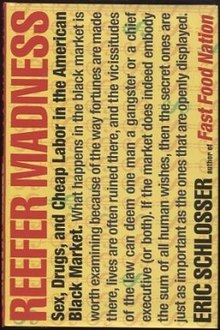Reefer Madness (Schlosser book)
 First edition | |
| Author | Eric Schlosser |
|---|---|
| Language | English |
| Publisher | Houghton Mifflin Harcourt |
Publication date | 2003 |
| Media type | |
| Pages | 320 |
| ISBN | 0-618-33466-1 |
Reefer Madness: Sex, Drugs, and Cheap Labor in the American Black Market is a book written by Eric Schlosser and published in 2003. The book is a look at the three pillars of the underground economy of the United States, estimated by Schlosser to be ten percent of U.S. GDP: marijuana, migrant labor, and pornography.
The book is divided into three chapters:
Chapter 1: Reefer Madness, Schlosser argues, based on usage, historical context, and consequences, for the decriminalization of marijuana.[1]
Chapter 2: In the Strawberry Fields, he explores the exploitation of illegal aliens[clarification needed] as cheap labor, arguing that there should be better living arrangements and humane treatment of the illegal aliens the U.S. is exploiting in the fields of California.[2]
Chapter 3: An Empire of the Obscene details the history of pornography in U.S. culture, starting with the eventual business magnate Reuben Sturman.[2] Schlosser closes by arguing that such a widespread black market can only undermine the law and is indicative of the discrepancy between accepted mainstream U.S. culture and its true nature.[clarification needed]
See also
References
- ^ Antthony, Andrew (May 18, 2003). "Observer review: Reefer Madness by Eric Schlosser". the Guardian.
- ^ a b Sifton, Sam (May 11, 2003). "Notes From Underground". The New York Times.
External links
- Eric Schlosser speech on The US Underground Economy - Reefer Madness
- Booknotes interview with Schlosser on Reefer Madness, June 15, 2003
- Presentation by Schlosser on Reefer Madness at the Miami Book Fair, November 9, 2003
- 2003 non-fiction books
- Non-fiction books about cannabis
- Non-fiction books about pornography
- Non-fiction books about immigration to the United States
- Works about magazine publishing
- Works about the informal economy
- Books by Eric Schlosser
- American books about cannabis
- Economics and finance book stubs
- Sex book stubs
